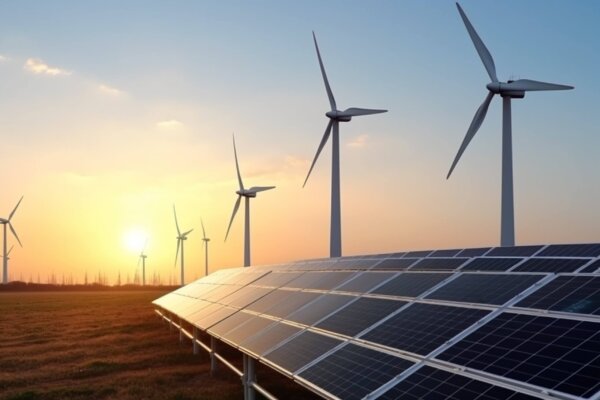In this month’s Bryt Insight we look at the measures put in place to mitigate the effects of the energy price crisis on business, and whether the path to net zero stays on track, given the shift in focus from sustainability to price and energy security.
Renewables
With the rising cost of energy continuing to affect businesses of every size, a lot of weight has been put on the importance of the government’s Energy Security Strategy – which was announced in April and aims to increase the UKs energy independence while the nation paves its way to net zero.
Included in the strategy is an aim for offshore wind generation to achieve 50GW by 2040, up from today’s total of 10GW. The recent announcement by The Crown Estate that it will be doubling its original investment of £25 million in its Offshore Wind Evidence and Change Programme to £50 million will support this target. The Programme aims to accelerate the UK’s offshore wind energy ambitions whilst protecting and maintaining clean, healthy, productive, and biologically diverse seas.
The additional funding will support research into the impact of offshore wind development on biodiversity, including the potential impacts on birds, marine mammals, and the seabed habitat. These results will hopefully define best practice for protecting and enhancing biodiversity, and so speed up the deployment of future offshore wind energy projects. This resonates with the sustainability strategy of our parent company, Statkraft, which is committed to mitigating its impact on biodiversity in a responsible way.
In other news, RenewableUK has unveiled a manifesto for decarbonising the UK electricity system by 2035. This would be achieved by targeting investment in the UK’s most affordable sources of renewable power – wind and solar – and reducing the UK’s vulnerability to volatile gas prices. Building up a new green hydrogen industry would also be a priority.
The organisation also called for an ‘evolution’ of the Contracts for Difference (CfD) auction mechanism, to incentivise long-term capital investment in major projects, develop supply chains and ensure consumers can count on ‘clean’ energy at low and stable prices.
Its report outlines areas in which the industry is making good progress towards the 2035 goal and where policy gaps remain. As well as reform of CfDs, it suggests that innovative new policies should be introduced to attract inward investment in supply chains — for example, creating new enterprise zones for offshore wind and applying tax relief or tax credits to businesses investing there, as happens in the US.
In addition, the report recommends streamlining the process of developing new offshore wind sites, consolidating skills, experience, and capacity into a centralised regulatory authority for consenting and licensing; as well as highlighting the need for a “fundamental redesign of the way we plan and deliver network infrastructure to connect offshore wind farms to the grid, to minimise the impact on local communities.”
Sustainability
A major new report from the International Energy Agency (IEA) has found that one third of the reduction in global annual carbon emissions needed to reach net zero by 2050 could be achieved by 2030, merely by accelerating existing energy efficiency improvements.
The IEA found that doubling the current global rate of improvement in energy intensity (a measure of how energy efficient an economy is in relation to GDP) to 4% a year had the potential to avoid over 26,000 TWh a year in energy consumption by the end of the 2020s.
This would be enough to:
- reduce global CO2 emissions by an additional 5 billion tonnes a year by 2030
- significantly move the world onto a pathway to net zero by 2050 with 1/3 of the total required emissions already achieved
- cut global spending on energy, which could see businesses save hundreds of billions of dollars a year on energy bills
- help create 10 million additional jobs in fields ranging from building retrofits to manufacturing and transport infrastructure.
One of the most effective ways for businesses to begin to improve their energy efficiency is by getting to know their energy consumption via a data visualisation platform, such as Bryt Envision. After understanding their usage, businesses are able to start to make behavioural changes based on these insights, to optimise their usage and reduce costs over time.
Energy efficiency can play a significant role in the environmental sustainability of a business, but research by Treedom has revealed that two thirds of employees are unaware of the sustainability policies of the companies they work for.
The study found even though 64% of European businesses have sustainability targets in place, the majority were not explaining to staff what they mean. Of the 7,000 workers surveyed, one in five said they were not sure whether their company even had a policy.
Here’s Jos Mister, Sustainability Manager at Bryt Energy, on how we connect employees with our sustainability work:
“We believe employers need to see sustainability as more than a tick-box exercise when it comes to communicating with their employees about company policies. Done right, it can encourage staff to make a real difference in the business — and in their homes and communities. At Bryt Energy, we found that talking to our team members about our commitment to sustainability from their initial induction helps them to feel connected to our goals, and we continue to keep everyone updated with our progress in company-wide updates and meetings. Some of our best carbon reduction initiatives have been suggested by our employees, so be sure to ask your team for their ideas!”
Energy
The parliamentary bill introducing a controversial ‘windfall tax’ on large oil and gas companies – first announced by Rishi Sunak back in May – has now been passed by lawmakers under new Chancellor Nadhim Zahawi. The new “Energy Profits Levy” is expected to raise £5 billion in its first year and was introduced as one of a number of measures designed to help consumers deal with rising energy prices. The bill went through parliament on Monday 11th July and at the time of writing is still to be approved by the House of Lords but is unlikely to see any more major changes. It sets an additional 25% windfall tax on oil and gas producers in the British North Sea and, after amendments, includes a definitive end date for the new taxation in December 2025. Cash raised through the levy until then will then help fund initiatives to support households with their rising energy bill.
But now the dust has settled on the announcement, analysts mulling over its ramifications are wondering whether the package, designed to help bill-payers, may have the opposite effect on the climate; Alongside the windfall tax, the Government announced that energy companies will be able to claim an investment allowance that will effectively give them 91% in tax relief on new investments. Eyebrows were raised when the Treasury released details which stated tax relief would only apply to new fossil fuel extraction, and not to investments in projects related to the net zero energy transition.
Despite being at odds with UK climate goals, this investment allowance was not changed by the new Chancellor. However, the bill does allow firms to mitigate the effects of the windfall tax by spending on decommissioning old oil fields and investing in the electrification of existing oil fields.
The Energy Profits Levy only applies to oil and gas companies; Renewable electricity generation and supply companies will not be subject to any additional tax, which should come as a relief to companies promoting the electrification of transport and heating as part of the move to Net Zero.
News in brief
The UK Government has confirmed it will start consulting on imposing a carbon tariff on imports. Proponents say it will tackle “carbon-leakage” and ensure low-carbon British businesses are not undercut by low-cost higher-emission imports. The proposed carbon border adjustment mechanism (CBAM) is similar to moves by the US and EU. Read more here.
_________________
The latest Climate Change Committee (CCC) Progress Report to Parliament warns that current policies will fail to achieve Net Zero unless focus shifts firmly to delivery. The private sector needs clear direction from the Government, credible delivery mechanisms and suitable incentives, yet in no sector of the economy is that yet complete.
Positives include:
- Emissions from electricity generation have fallen by nearly 70% since 2010, thanks to the growth in renewables.
- EVs are being adopted at pace and ahead of CCC and government projections.
Could do better:
- The Government must get to grips with the gaps in policy to better insulate homes, to cut emissions and bills.
- The report calls for a renewed focus on agriculture and land use, which has some of the weakest policy areas, despite being vital to Net Zero, food security and biodiversity.
Learn more about the report, here.
________________________
At their recent Berlin summit, G7 leaders made scant progress on accelerating the energy transition. However, they did agree to create a ‘Climate Club’, which aims to ‘advance ambitious and transparent climate change mitigation policies towards climate neutrality’.
You can learn more about the Climate Club here.
TALK TO OUR TEAM
If you have any questions on how any of the updates might affect your business, our team of experts is on hand to answer them. You can get in touch with us on 0330 053 8620 or at heretohelp@brytenergy.co.uk.
Sources


